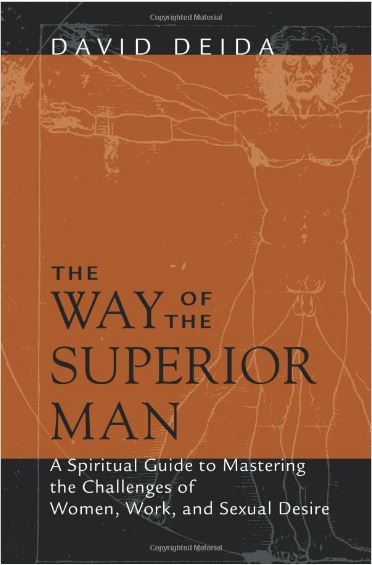 The Way of the Superior Man: A Spiritual Guide to Mastering the Challenges of Women, Work, and Sexual Desire by David Deida
The Way of the Superior Man: A Spiritual Guide to Mastering the Challenges of Women, Work, and Sexual Desire by David Deida
Reviewed by David Lorimer
The interface between spirituality and sexuality is a road less travelled in Western culture. While Indian and Chinese civilisation have long traditions in this respect through Tantra and Taoism, the West finds it a challenging area but one that is currently being re-envisioned by a number of pioneers. More widely, our relationship to sexuality mirrors that towards the body, the feminine and Nature. The evolution of our thinking is brilliantly documented in Riane Eisler’s masterly work Sacred Pleasure, which extends her discussion of the dominator and partnership models of society described in The Chalice and the Blade. Other spiritual teachers who have written seriously in this area are Osho, Barry Long, Adi Da and Dieter Duhm, whose book Terra Nova I reviewed in the last issue.
David Deida is the author of a number of books on sacred sexuality, including Intimate Communion and the corresponding book for women, Dear Lover. It would be misleading, however, to give the impression that this book is limited to spirituality sexuality. Rather, it is a spiritual guide to mastering the challenges of women, work and sexual desire, to living the masculine life freely and to the full. The eight parts cover a man’s way, dealing with women, working with polarity and energy, your dark side, feminine attractiveness, bodily practices and men and women’s yoga of intimacy. Since the 1960s, men have been encouraged to embrace the feminine and women the masculine, but this has had a fallout in terms of the evolution of our intimate relationships which can easily become a 50-50 situation where there is a loss of masculine and feminine polarity between partners and therefore a kind of neutrality in the relationship. For Deida, the masculine and feminine poles represent the quest for freedom and love respectively, but a man’s mission nevertheless remains central to his life. He encourages men to commit themselves beyond fear, giving the gifts both to the world and to their woman. This means they will be fully alive, open and present, in touch with their deepest desire also represented in their purpose.
Deida is very good advice for men who have trouble dealing with the emotions of their partners and their immediate expressions of feeling. This is where men can open their own hearts to love rather than try to fix the woman: ‘penetrating her closure with your fearless presence,’ praising and appreciating her rather than expecting her to change. Each serves the other in growth and love. He suggests that ‘the best way you can serve your woman is by helping her to surrender, to trust the force of love, so that she can open her heart, be the love that she is, and give this love which naturally overflows from her happiness.’ None of this involves analysing blocks. Men need to remain strong and stable in their presence, maintaining full consciousness in all situations and remaining in masculine clarity and decisiveness so that she can relax and trust. Ultimately, Deida argues, the search for love and freedom which is the same destination of the unbounded and infinite ground of being that we are.
This involves letting go boundaries, loving with abandon and dissolving in the immense force of loving that corresponds to the death or transcendence of ego. By dying into love, there is no need to hold onto yourself. This is perhaps the deepest insight of the book, feeling your partner while unobstructedly extending your love beyond yourself. This is what he calls intimate communion or deep oneness, which is also our ‘ultimate desire for the union of consciousness with its own luminosity.’ The consciousness of the masculine matches the energy of the feminine, power and trust meet devotional surrender to divine love through the body. I was also struck by Deida’s remarks on the correspondence between radiance and beauty, which is an expression of life itself where the woman is open, trusting, connected and loving.
One should not have to wait until later life before absorbing the essential insights of this book, and it is significant that prominent women writers like Marianne Williamson, Mariana Caplan and Marci Shimoff have also endorsed the book along with Tony Robbins and Ken Wilber. Deida helps men to understand women much better while also helping them understand themselves and their potential for real integration and intimacy.
